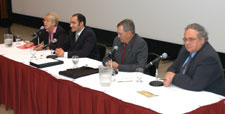Do no harm, leave no trace, engineering students told
Ordre des ingénieurs due Québec panelists discuss sustainability as a working goal

Students were able to learn from a number of engineers during this year’s Engineering: A Profession, a Passion conference. Professor Maria Elektorowicz (far left) answers a student’s question during the sustainability panel on the second day of the conference. Listening are (from left to right) alumni Mario Ciaramicoli, Henri Paul Martel and Bernard Boire.
Photo by Marc Bourcier
“Leave no trace.” Concordia alumnus Mario Ciaramicoli (BEng 02) applied this hikers’ motto to the vocation of engineering. He contends that spiraling energy costs and ever-diminishing resources mean engineers must design projects with limited negative environmental impact.
Ciaramicoli was speaking in a panel discussion about sustainable development at the third annual Engineering: A Profession, A Passion event, held at Concordia under the auspices of the Ordre des ingénieurs de Québec (OIQ).
Henri Paul Martel, of Aéroports de Montréal, remembered the 1976 James Bay project as the first time he encountered an environmental overseer on the job site.
“We suddenly had to integrate what we’d always done with environmental concerns,” he said. “There was at least one time where I thought we might have a fist fight.”
Professor Maria Elektorowicz acknowledged that sustainability was once considered an oxymoron in relation to engineering. Decision-making was supposed to be based on “technical and financial considerations.” Many greener alternatives, in materials or design, are initially more expensive, in contradiction to engineers’ mandate to keep costs low.
She compared the priorities of an engineer to a stool balanced on the three legs of environmental, economic and social concerns. “If any one leg is weak, the stool will not be able to stand”.
This evolving definition of the engineer’s role was explained by panelist Bernard Boire, of the OIQ, as “reflecting the values of a society.” As societies have looked to conserving resources, engineers have integrated those expectations into their work.
Ciaramicoli, an energy specialist with SNC Lavalin-Nexacor, described how those principles translate into his practice. He has experimented with measures as low-tech as changing the sequence of operations and has high-tech as using wind turbines as power sources.
He also pointed out that some innovations require common sense. Instead of using energy to provide cooling systems for equipment, “we live in Canada — there’s cool air out there.” Taking advantage of that cooler air becomes the challenge for a socially responsible professional.
He encouraged students to take up advocacy roles promoting renewable energy sources, or alternatives to existing ones.
“If everyone in this room demanded a hybrid car, I guarantee there would be more and cheaper models, ” he said. Besides demanding change as consumers, engineers can influence government policy to reflect environmentally responsible options as well.
President Claude Lajeunesse opened the conference on Sept. 28, welcoming participants “proudly as an engineer and member of the OIQ.” He urged students to consider the challenges and opportunities presented over the two days that followed.